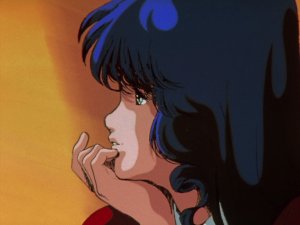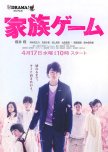
A difficult yet riveting watch, Kazoku Game turns the family genre on its head. As it adopts an uncanny, dangerous atmosphere, one is often left with the feeling something is not quite right. Even when things appear to be going beautifully, the viewer can never truly settle into a sense of well-being. This unshakable near-paranoia bolsters the mystery presented by the story, begging one to question why the Numata family is in such a state, and what the home tutor hopes to gain from his actions toward them. Because this is clearly a fantasy, issues are relatively negligible with the plot. Despite this, I could not help thinking that if anyone did a quarter of what is seen in this drama, they would be shackled in seconds. Potential viewers beware: triggers abound. Violence toward and between children (including intense bullying), sexual assault, and suicide, are concepts of varying visual importance displayed on screen.
Powerful performances from the ensemble must be applauded. Of the actors and actresses which comprise it, none are weak. Few seem to rant about Sakurai Sho as an actor, but his portrayal of the tutor was especially memorable. Whether through his manic cheer or vibrant cruelty, the character springs to (somewhat nightmarish) life with ease. One may never forget the way Sensei swings his arms childishly while walking, or the frozen doll-like smile he offers to others. And his catch-phrase, "Ii, ne!" ("That's good!") is simultaneously menacing and catchy.
Young actors Kamiki Ryunosuke and Uragami Seishu are also notable, capably carrying out their roles as the troubled Numata sons. Uragami-san as Shigeyuki has an honesty about his depiction, true awkwardness and immaturity (good and bad) many will see themselves in. Something of a screen veteran despite his young age, Kamiki-san has a meatier, more complex role. His character has less relatability, but remains fascinating and nuanced because of his fine performance.
Most tunes heard in Kazoku Game are used to boost its eeriness. Brass instruments and a lone, creepy saxophone lead almost all instrumentals. One particular track stood out, partially because it was played so often and also because it was somewhat sinister. Whenever it marked a scene, something cruel was realized or a strange event had taken place; but the tone was cheerful -- aside from the purposely off-tune lead instrument. I also rather enjoyed the theme "Endless Game," provided by Arashi, and the very suitable introductory piece. My only problem with the soundtrack was that it ultimately felt repetitive, but perhaps that was also intentional.
Considerați utilă această recenzie?
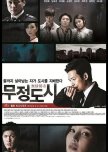
Writing for this series remained consistent and strong throughout, even maintaining good pace. Characters rarely failed to behave in an intelligent manner. The much-lauded, flooring twists are just as crazy as you've heard (and better yet, even supported by prior evidence in the story). What is most impressive to me though, is that the script remains faithful to itself and the spirit of the genre. We are shown a seedy, pessimistic world which is…well, cruel. Potential viewer expectation aside, this kind of darkness is what we were promised from the first and delivered at the last.
Nearly every lead was dynamic, from Shi Hyun and Hyung Min to Jin Sook and Safari. Even the hardcore villains had strokes of complexity which made most more than mustache-twirling monsters. These grounding factors may not cease our hatred of them, but at least add some level of understanding. Yoon Soo Min likely is the weakest link of the main cast, her arc included; she needed a bit more weight to contend on equal footing with the other plot lines. The completion of her journey manages to be satisfying nonetheless.
Jung Kyung Ho shines brilliantly as both star and main draw of Cruel City. Decadent charisma pours from him in droves, lending his Doctor’s Son an impossibly fierce magnetism. The most compelling action sequences belonged to Kyung Ho also; I quickly fell in love with his sharp knife skills and cat-like elegance. It's important to note he filmed the final episodes with a nasty back injury; his epic performance is not only a product of talent, but dedication and hard work. This drama was also very kind to Lee Jae Yoon, whose slowly developing Hyung Min I gradually gained affection for. He portrays the team leader as smart, sympathetic, and steady -- with a shot of menace to prevent him being a boring goody-two-shoes. Honorable mentions go to Kim Yoo Mi and Yoon Hyun Min; their respective characters Jin Sook and Hyun Soo are over the top cool and attractive. To say I became deeply invested in the fate of both of them is an understatement.
“Love is dead,” according to one of Cruel City’s most recognizable themes: Kim Young Jin’s “Wound.” My love for the music will never die, though. It is stirring and atmospheric, always well-utilized in show. Even instrumental tracks are memorable, though the rare vocal was always delicious. Many fans here at MDL went crazy trying to find out their artists and song titles before the soundtrack was released.
Considerați utilă această recenzie?

Despite flirtation with the idea of what it means to be a woman, core themes center around poverty, motherhood, and family (fractured and/or 'whole'). Many will find parallels with real life, uncanny sparks of the every day between each character interaction or plot motion. Though the story can be depressing, sometimes unrelentingly so, rays of hope peek through from unlikely places. The slow pace also works well, allowing for quiet sequences and subtle explosions to be worked in without unevenness. Unfortunately, well written as I found it, there were times an event or character seemed superfluous. A glaring example of this would be the welfare worker and his wife. Their tale felt unimportant and tacked on, the purpose served more thematic than necessary -- and even then, other characters had already fulfilled this aspect well. The Shiori character was perhaps a bit underdeveloped in the end, but her place in the plot was decidedly important.
Where have they been hiding Mitsushima Hikari? If the rest of her work is as vibrant as her portrayal of Koharu, it wouldn't be far-fetched to name her among the best actresses in Japan. Mitsushima-san delivers lines as if they were second nature; her gestures and body language are subtle and real. She positively carries this drama, though her work brought up the performances of others as well. The young ones depicting the Aoyagi children are also an absolute joy to watch. More than just precocious cuties paid to be tiny versions of adults, each of them felt like actual children. They babbled and asked questions endlessly, they cried without reason, they understood more and less than adults might want. This was especially true of Suzuki Rio, as the older Nozomi.
Fans of Oguri Shun should be happy with his solid performance, but will not want to watch Woman primarily for his sake. Shun-san is primarily seen through flashbacks, and though his character is important enough to warrant a spot as a main character, it is in the same way as a literary character might be labelled as such. The absence of his Shin is what pushes the basic conflict. There is a particular scene including him which had me bawling, though.
Musically, the drama stands strong. Orchestrations felt well-placed, especially in those scenes meant to be pivotal. These are also marked by unusual but interesting cinematographic sequences, such as an intense slow motion bit, set to an older song called "Believe." These instances were a little disconnected from the rest of the drama, but strangely effective. Though the sound of the theme song ("Voice" by androp) does not initially appear suitable, the lyrics tell another tale.
Considerați utilă această recenzie?
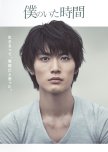
Boku no Ita Jikan
64 oamenii au considerat această recenzie utilă
Boku no Ita Jikan (“The Time I Was In,” internationally titled “The Hours of my Life,”) acquaints viewers with ALS, while painting an intimate portrait of a certain afflicted young man. This drama exults in the ordinary, from sets to characters and even plot points. Yet the propensity toward simplicity is exactly what produces any brilliance it might find. Main character Sawada Takuto could be any 20-something in Japan, but he could just as easily represent any young person anywhere. His goals appear unremarkable, his relationships familiar, his hobbies commonplace. But because they are also realistic, the generated reliability helps to connect viewers to the show. If nothing else, it will leave one questioning themselves. "How have I lived until now? Have I taken my time for granted?"
I would categorize this drama as inspirational, though also quite tragic. Many uplifting moments occur, yet these can be just as painful as the tearjerker scenes. For those wondering, a rather good love story does exist (and with surprising maturity, despite at least one "fish kiss"). There are a few cliches, unfortunately, including the most dreaded irritant: noble idiocy. Veterans of the genre might not enjoy Boku no Ita Jikan as much as others, either; there have been stronger, similar forays, though it brings a youthful flair to the table.
Miura Haruma starred in one of my first experiences with Japanese cinema about a thousand years ago, coincidentally another disease-oriented tale (Koizora). Though I've barely seen him after, I never forgot the effect that initial performance had on me. Meeting Miura-san again in Boku no Ita Jikan, I’m pleasantly surprised at his immense growth from then. His turn as Takuto is delightfully ordinary, yet powerful in its modesty. Most memorable will be his optimistic smile, though there were times I was floored in how deeply I felt Takuto’s fears. An actor with potential indeed.
I found leading lady Tabe Mikako only decent, though she performs well for the most part. Her Megumi takes the longest to “settle” and characterization seems somewhat fluid until around the mid-point. Chemistry with Miura Haruma is consistent, if more strongly felt in later episodes. Saito Takumi looks his best, though character Mukai Shigeyuki possesses a selfish streak. Due to subtle writing and this actor’s innate charm, Shige nevertheless remains painfully human. He might be a flawed jerk in many contexts, but he also has the potential to be genuinely friendly, observant, and likable in others. Nomura Shuhei is also notable, as he develops Rikuto into an surprisingly adorable and complete supporting character.
Pretty music accompanies Boku no Ita Jikan. Of particular note are vocals from Rihwa (“Harukaze/Spring Wind”) and Yuzu (“Yorokobi no Uta/A Song of Joy”). Sound effects are also utilized to a heart-rending degree, including the sound of a ticking clock bridging between scenes.
Considerați utilă această recenzie?
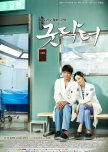
Un doctor Strălucit
47 oamenii au considerat această recenzie utilă
Despite billing itself as a medical drama which features a savant surgeon, Good Doctor evolved into quite a different animal. While it does feature bloody surgeries and a hospital atmosphere, this drama yearns to be an inspiring slice-of-life. Most patients serve as episodic cases and often provide the backdrop for the hospital staff to interact. Though the medical side was handled relatively well, it often felt gimmicky. Developments between the hospital staff seemed much more important to the writers. To their credit, character interaction is where this drama excels. The exchanges may elicit wide ranges of emotions from viewers, anything between sorrow and anger to warmth and joy.
Certain things did not work as intended. Hospital politics feature in most medical dramas, but they were boring and unnecessary in Good Doctor. A particular romantic red herring exists (as they always do), taking up a large chunk of episodes. When things are finally sorted, the "proper" progression initially feels jagged and too quick -- despite the pairing itself being very nice and even desirable. This phenomenon of sudden forward motion occurs also with the lead character, as he moves from extended developmental purgatory to huge successive change. Even these issues are somewhat forgivable though, due to the power and likability of the actors.
As you might have garnered, Good Doctor features an earnestly talented cast. Joo Won shines at the top as gentle-hearted savant Park Shi On. Everything about his performance, from the way he held his body to his speech, spoke of good research and execution. Prickly Kim Do Han is something of an internet sensation, lovingly dubbed Doctor Wook ("anger") by Korean netizens. Joo Sang Wook brings natural charisma to this role, believably building a man colored by both by hardness and secret warmth. Though she was handed a character with little back story, something about Moon Chae Won just clicks. Her Cha Yoon Seo might dole out less impact, but she serves her purpose well. All three have wonderful chemistry, in any combination. Of the supporting cast, nearly everyone involved with the hospital politic aspect of the plot felt wasted. This is especially true of Kim Min Seo, Na Young Hee, Chun Ho Jin (who always seemed thunderstruck).
Many musical tracks were great, especially instrumental pieces. Various themes adopt an ethereal quality and a nonsense language reminiscent of Yuki Kaijura; these are masterful. Unfortunately, traditional vocal pieces are far more numerous than expected. This led to many forgettable ballads; during a particular episode, they actually stuffed every single into the action -- and topped the final scene off with an entirely new song! Despite this slight overcrowding, most were at least decent. Standouts include "I Am In Love" (2BiC), "How Come You Don't Know?" (Kim Jong Kook), and late game offering "Love Medicine" (Joo Won).
Considerați utilă această recenzie?
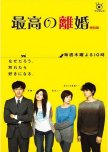
Saikou no Rikon
34 oamenii au considerat această recenzie utilă
Though sometimes one may see it advertised as such, Saikou no Rikon cannot be called a true "romantic comedy". It watches more like a slice-of-life, centering around two couples (whose respective relationships may or may not be crumbling). The comedic aspect hits as often as it misses, despite passable delivery from involved actors and actresses. Emotionally rich and intense scenes outweigh these in sheer remarkability; in fact, the levity issues are approached with at times (such as the occasion divorce is brought up for one of the couples) actually leaves the whole product feeling a little inconsistent. Am I watching a zany Japanese relationship lark or this heavy treatise? Because some elements did not wholly jive (at least for me), those thoughts popped up frequently over the course of the series.
Where the drama excels must be dialogue, which is razor-sharp and surprisingly natural. These characters speak like real people, even showing pop cultural awareness. An engaging way speech is used is also in the way characters loose their frustrations to others; they tend to tell strangers and service-providers in these long-winded monologues, unable to vent to anyone closer. What it lacks in stunning backdrops and visual candy, Saikou no Rikon makes up for in thoughtful camera work. With a sharp focus on the inner workings of married life in mind, shots often adopt voyeuristic qualities. For instance, we might see an argument from a fly-on-the-wall perspective in the kitchen, overlooking the entirety of a small apartment made for two.
Eita headlines a solid cast, swinging all his powerful versatility behind the (initially) repellent Hamasaki Mitsuo. This is a character that embodies everything wrong in a husband, from his incredible pettiness to the selfish way he views most everything. The first time he tells his wife something between them was her "personal problem," even threw me back into some bad memories of my own. However, Hamasaki exhibits incredible personal growth throughout Saikou no Rikon (with Eita totally inhabiting the role). Ono Machiko, as his polar opposite and somehow wife Yuka, has a fantastic showing also. Whenever Yuka showed weakness or had something big to say, Ono-san knocked it out of the park. Her role, despite early episodes showing her through her husband's perspective, is lovable and sympathetic; women will definitely identify with her best.
Ayano Go and Maki Yoko portray strange duo Ryo and Akari, whose tale most interests at first glance yet slowly is overcome by that of the main couple. Both are fine actors and do beautifully in their scenes. Unfortunately, paired with the "that's just how things are" attitude the characters take to one another and themselves, the too-fast wrap to their story leaves the entire relationship a little hard to watch and slightly unsatisfying to finish (unlike that of the main couple).
If Saikou no Rikon is a hero wielding dialogue as its best weapon, music will be its Achilles Heel. Having just come down from a marathon of the series, I can scarcely remember any specific tracks. There was at least one quirky instrumental number, but the only truly memorable song is ending theme "Yin Yang" provided by the amazing Kuwata Keisuke. Despite not being a song to my taste, it suits the drama exceedingly well. And that wild ending sequence that accompanies it? Positively awesome.
Considerați utilă această recenzie?
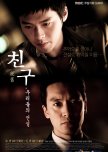
Friend, Our Legend
25 oamenii au considerat această recenzie utilă
One enormous difference from other South Korean programs becomes apparent even before the series starts. Friend, Our Legend holds the distinction of being one of relatively few pre-produced dramas in that country. Free from pressure brought down by viewer feedback and ratings, no sudden crises could derail the vision. The effect is immediately noticeable when a story is told as intended.
On the surface, the aforementioned story appears to be nothing special. It is “merely” the tale of four close friends, whose troubled lives follow very different (and sometimes tragic) paths. Instead of falling into pitfalls of humdrum cliche or weepy melodrama, Friend, Our Legend elevates itself to an almost epic human story. Perhaps the plot moves slowly at times, but a subdued pace allows for the greatest understanding of characters and their circumstances. Viewers follow them through their lives, watching through childhood, right into high-school and adulthood. This aspect creates the sensation of knowing everyone in the drama intimately. Above all, realism might be the best thing Friend, Our Legend has going for it; even gangster culture is portrayed violently and without glamour…as it ought to be.
There’s always a catch, of course. Friend, Our Legend hurts to watch. Rather badly, in fact. I cannot, in good conscience, recommend this series to any empathetic or sensitive viewers. It is a violent and tragic experience, grim and heartrending. Bright spots exist in the narrative, but one always senses the storm will soon return. One should not expect to walk away from this experience smiling, but that isn't always the point. Sometimes the point is to become wholly immersed, to be affected, to think and feel deeply.
Actual problems do exist. One thing which didn't work for me was the unique flashback technique used in initial episodes. These sketch out the end-game of the drama, supposedly to drum up interest for the “how” of events rather than the “what.” This smacked of gimmick, as a linear telling would have done the trick without any of the added confusion. There was enough foreshadowing in the main body of the drama anyway. At the very least, it does not detract from enjoyment.
Are you a fan of Hyun Bin? If you said “No,” sit down with this and you will be. If your answer was “Yes,” tune into Friend, Our Legend immediately. Han Dong Soo might be the greatest role of his career thus far. “But what about Secret Garden?” you might ask. As well as Hyun Bin performed in that lovable drama, consider it a mere shadow of his work here. An actor might search his entire life for a particular character, a complicated and difficult one, the true challenge. Hyun Bin not only found his in Dong Soo, but completely inhabited and owned it. How incredible to watch a character as he evolves so completely.
Talented Kim Min Joon, who seems to catch my eye often nowadays, also captivated me as Lee Joon Seok. He might be chronically plagued by bad hair and fashion crimes throughout, but the character allowed him to showcase enormous range. Working with co-star Hyun Bin, he made me believe in the friendship between Dong Soo and Joon Seok...and many other things besides. In the form of Choi Jin Sook, Wang Ji Hye finally strikes a role to impress. My estimation of her rose from a pleasant presence to serious artist, all within the span of a few episodes. Though she leads a harsh existence, her Jin Sook displays strength and individualism that never allow her to be just "the love interest." This can be attributed to Ji Hye as much as the script.
Of the supporting cast, Seo Do Young fills up the roster steadily, while Lee Shi Yun refreshes with much-needed comic relief.
I loved the majority of the soundtrack to the depths of my heart and back. Other than some dated misses, especially suspense and gangster-centric sequences, everything fell mostly on point. Emotional scenes were often accompanied by mellow violins or a quiet, nostalgic female vocal, lifting them to new heights. Among the many fantastic inserts are “Closer” (Alex), “Can’t Have You” (Hyun Bin), and “Go and Erase Your Tears” (SS501’s Heo Young Saeng). Fans of Big Bang will also recognize “Friend,” (Tae Yang and T.O.P).
Considerați utilă această recenzie?
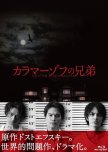
Karamazov no Kyodai
26 oamenii au considerat această recenzie utilă
In particular, the cinematography is rock solid. The shots inside the Kurosawa house are some of the most gorgeous and use interesting angles to bring out the dark veil hanging over the place. Beyond those deliberately called attention to by the story, decorations and objects often appear in the same frame as characters--acting as mute symbolism for the person or their situation. This aspect is easy to miss the first time around and is a good reason for a re-watch. Some viewers might find them unsettling or even irritating, but occasionally disturbing clips and images appear between stops in the action. I find them instrumental to the feel of the story.
Music is also masterfully utilized, with the orchestrations displaying delicious moodiness. Vocal tracks will be easily recognized by most everyone, as the bulk of them are classics. The lyrics of these songs (like Paint it Black by The Rolling Stones or Nirvana's Smells Like Teen Spirit) could not have suited the situations they were used in better. Honestly, the first time Paint It Black played over a scene, goosebumps came. I also need to give a special mention to the sound effects team, because sometimes a noise would halt the music. For instance, when Isao is talking to Mitsuru at the bar, the sound of his glass settling on the table signals an eerie silence.
All of the brothers were played well, each actor filling their role believably. If I had to pick a favorite though, Ichihara Hayato would win the contest by miles. His portrayal reminds me of a tragic hero from a Gothic romance, tortured and barely keeping it together; but on the outside he's everything you'd want your son to be, handsome, elegant, and successful in his career. Ichihara-san is especially good at acting with his eyes and often made incredible blocking choices in his scenes. It'll be a blessing if he can get more meaty roles like this; he's a magnetic presence on the screen. On the other side of the spectrum is the cartoon-ish detective, who unfortunately was present during all of the scenes inside the interrogation room. His voice drove me crazy, because he kept speaking in this strange purr that sounded more suitable for a villain in a child's anime.
I'll end by saying that while this is a story of pain, abuse, and ultimately murder, it's an easy watch...if you can handle that. The episodes are short and hook you in, especially if this genre is your bag. If you're anything like me, you'll end up eager to get to the end and watch most of it in one go; once you're there, you might just not see the end coming.
Considerați utilă această recenzie?
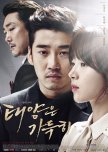
Beyond the Clouds
37 oamenii au considerat această recenzie utilă
And so it goes with Beyond the Clouds, whose central theme is just this. Don’t mistake the drama for a common revenge yarn; though payback might be a driving force for many characters, it’s hard to call it “The Point.” Viewers should instead expect a classy, fatalistic romance, complete with slow-burning melodrama. Will these two deeply traumatized people fall in love despite their cruel circumstances? If they do, will a romantic connection hurt even more—or heal both, becoming their silver lining? That’s more “The Point,” and also the element that works most beautifully.
As to the revenge aspect, it’s fine if sometimes messy. I never fully believed or enjoyed the con-man angle. The “big bad” felt one-dimensional, as did his motivations, while other early villains were the same or even slightly unnecessary. That said, the dangerous atmosphere and situations created by their influence was excellent. It’s an odd combination, but it works.
Yoon Kye Sang stars as Jung Se Ro, a gentle man whose experiences have left him unpredictable and angry. This actor shines in Beyond the Clouds, handsome and magnetic. He grabbed my attention as if grabbing my head with both hands, so striking was his performance. Together with leading lady Han Ji Hye, he shared sparkling chemistry. Ji Hye enchants as Han Young Won, playing emotional and romantic scenes well. However, I often noticed her eyes open too wide too often, or glued firmly to the floor. The character can be meek on occasion, but these mannerisms were not strong choices at all.
Though I wasn't crazy about the whole con-man thing, Jo Jin Woong presents well as complicated Park Kang Jae. He’s the most believable and human of the seedy bunch, even the best connected to the main story. Tearful scenes seem to be his forte; he’s fantastic at them. A special mention is reserved for Kim Young Ok, probably the best “grandmother” actress ever. She made me cry so many times it isn’t funny.
Both cinematography and music embrace an elegant, almost classic feel. Early scenes in Thailand are a feast for the eyes, though the rest of the drama delights as well. Songs were well-chosen and interspersed to optimize emotional effect. Unlike in other melodramas, I never grew bored of any of it. Some great vocals include “Whale” (Zitten), “Sin,” (V.O.S), and “The Full Sun,” (Yang Pa).
Considerați utilă această recenzie?
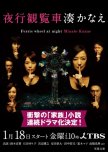
Yakou Kanransha
36 oamenii au considerat această recenzie utilă
As implied above, Yakou Kanransha delves into the effects a shocking murder has on two families (and the town in which they live). It is an emotional story marked by highs and lows, much like the ever-rotating path the titular Ferris wheel follows. Other issues tackled over its course include bullying (by neighbors and classmates), ostracization, domestic violence, and societal pressure. Unlike many other Japanese dramas with such a focus, family is not held on a pedestal. Instead we're shown a realistically flawed structure, full of secrets and misunderstandings. Despite this, beauty remains to be found in the connection between friends, brothers and sisters, parents and children; something so imperfect can still be wonderful.
Most incredible might be how deftly these emotive aspects are combined with exciting, cerebral ones. Character development intermingles flawlessly with shocking revelations and startling secrets. Scenes are rarely lingered on; the pacing maintains a seamless stability throughout the series.
Japan excels at the ensemble piece; Yakou Kanransha boasts a large cast which more than lives up to this standard. Suzuki Kyoka clocks in a believable and solid performance as Endo Mayumi. This role is written simply so she might serve as our eyes into this fantastic circumstance; despite this, Suzuki-san completely brings her to life. Among the other adults, Yasuda Shota and Natsuki Mari are of great interest. Natsuki-san plays an especially polarizing part, yet her consistent and complex portrayal makes quite the impression.
But young actors Nakagawa Taishi (15) and Sugisaki Hana (16) completely steal the show. Both deliver honest and affecting performances beyond their years. Particularly Nakagawa-san; it floored me how drawn into his scenes I became as the series rolled along. Definitely a budding career to watch.
If like me, music comprises an important part of your viewing experience: take heart. Yakou Kanransha posesses an immaculate soundtrack, full of richly mysterious strings and hollow piano. There are also fine vocals, such as those from Ai (ending theme "Voice," which exudes action), and Reiko Oshima ("Daydreaming," a hopeful ballad with a bittersweet feel). Other highlights include the masterful use of sound effects; during particularly intense scenes, one can sometimes hear the grinding machinery and clacking carts of the Ferris wheel. Also take note of its use as imagery between scenes; you'll never forget the way it looks, brightly lit at night.
Considerați utilă această recenzie?
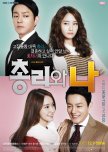
Prime Minister and I
29 oamenii au considerat această recenzie utilă
“Charming” describes much of this series well. Contract marriages are nothing new to our beloved world of dramas; surely, viewers could also point out dozens where the unavoidable presence of an outsider begins to positively affect a fractured family. But what made Prime Minister and I quite nice was not any presumption of originality, but rather its lighthearted, laid-back shuffle of quirk and classic cliches.
Pacing between dramatic, romantic, and comedic elements typically held up well. There was even a refreshing honesty between characters and even quickness of resolution that I rather enjoyed. Da Jung (Yoona) interacted so naturally with Kwon Yul (Lee Bum Soo) and his children; this entire group of characters were a joy to watch, especially together. Early episodes might have exhibited cinematographic awkwardness, but any such issue was quickly ironed out. Basically, until the final episodes, few problems presented themselves.
All that changed with the poor handling of a certain plot point. As a result, the last three or so episodes seemed to develop anemia. The innate charm still existed, but the drama became paler, poorer, and less fun. This happened to various characters as well. One moment had me sad the series was ending, the next wondering what went wrong with the basic rhythm of the show. Even with this unfortunate turn of events, Prime Minister and I stayed cute and entertaining for most of its run. Even with the big anti-climactic "blah," I have no regrets having watched it to completion.
Lee Bum Soo has often been described to me in glowing terms. It’s shameful, but this is actually my first encounter with him. But what an impression he made! His Kwon Yul felt fully realized and remarkably attractive, despite being depicted as a little stiff and unbending by the writing. Warmth and gravity is important for romantic leads, and he delivered well. Leading lady Yoona generates controversy whenever the subject of her acting pops up. Many say she improved from previous encounters, but my own inexperienced commentary to this point would be useless. For the most part, I found her Da Jung likable and found no real problems with the portrayal. She worked well with Lee Bum Soo; there *was* chemistry, just the quiet sort. Scant physical contact, as well as script failings, dashed the potential in this case.
Yoon Shi Yoon broke my heart somewhat. Not because of anything that befalls his Kang In Ho, but rather the role itself. Character trajectory makes it difficult to like or sympathize with him much, even though the actor looks great and performs well. Ryu Jin (Park Joon Ki) is also gorgeous and caught my eye more often than not, but suffered from the same problems. Returning to the positive, all three child actors were not only perfectly adorable, but competent as well. Little Lee Do Hyun as Man Se, need I say more?
Several instrumentals caught my ear over the course of Prime Minister and I, but truly memorable tracks landed with the vocals. These include two very nice ones from SHINee’s Tae Min (“Steps”) and Yoo Gun (“I Love You To Death”). But as with the cinematography, I found some musical choices a bit messy in initial episodes.
Considerați utilă această recenzie?
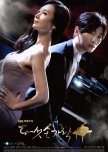
Joo Ji Hoon will be the initial draw for many. His performance as Yoo Ji Ho is tremendous fun. While the character starts off ridiculously trusting and naive, his development in the second half more than makes up for it. This point is also where Ji Hoon settles into his element. Seemingly improved from Warrior Baek Dong Soo, Ji Chang Wook plays a precariously balanced role with ease. I wanted to hate his Yoo In Ha, but couldn't completely; he was such a pitiable man and, in another life, things might have been different. The three veteran actresses portraying the mothers were also compelling, Chae Si Ra in particular. It must have been difficult pulling off such a complicated character like Young Rang.
Music may be considered another star in Five Fingers. There were many pleasing vocals, including a sad theme by Ji Chang Wook himself: "Fills My Heart." Lim Jeong Hee's "Don't Love Me" seemed to play the most and nearly brought me to tears once or twice. Classical and original instrumentals pepper the rest of the scenes. These work marvelously to amplify their impact and while dynamic, never bring the action over into the cheesy.
Viewers should be aware that Five Fingers deals in themes of domestic abuse and portrays one of the most dysfunctional families ever to grace the screen. The portion before the time skip can be a little hard to watch, and personally my emotions were all over the place.
Considerați utilă această recenzie?

Beethoven Virus
28 oamenii au considerat această recenzie utilă
The story line is very unique, both in subject matter and tone. We follow a group of normal people following the dream of orchestral performance together, under the direction of a conductor who is as rude and arrogant as he is famous and talented. The experience and accompanying tribulations change their lives, as you might expect, but the difference can be genuinely felt. There may be unbelievable circumstances that bring these people together, but the way they progress and transform is realistic and subtle. Some may complain the final episodes are bittersweet and somewhat open-ended, but I feel they composed the perfect ending for a story such as this. Any other result would have felt too saccharine, especially with the heavy emotions this drama evoked. We pursued a dream with these characters, but it's really not the result that matters...it's the path we took and what we choose to do after.
This is also the first drama where I've felt I would actually miss the characters after completion--in particular, abrasive conductor Kang Mae as played by Kim Myung Min. His acting really is as outstanding as everyone says it is. It's a rare gift to see a character spring to life as vibrantly as this; he felt like a real person separate from the actor, no doubt thanks to his extensive preparation. I mean, Myung Min was actually even able to conduct an actual orchestra at a press conference for this drama...something he'd learned how to do in five months. Another favorable mention must go to Jang Geun Suk, who was still in the early stages of rising fame (and looked nothing like he does now). I'm not sure he's played a part like this since, but I'm hoping he will soon. His Gun Woo was an earnest, hardworking, genuinely good kid...but with very human failings and no sob story to excuse them. Geun Suk was a joy to watch too, and stood competently alongside the great Myung Min as his foil.
As to music, as one might expect, there's a ton of classical used in Beethoven Virus. The performance sequences utilize elegant and meaningful pieces, looking as good as they sound. Other works serve to fit scenes as background tracks, and add a delicious feeling of high drama without also becoming cheesy. Fans of instrumental music and classic in general will love it, while others might find a spark of interest growing in them after watching! Vocal tracks are also great, with Insooni's inspirational number "A Goose's Dream" basically summing up everything Beethoven Virus stands for.
Considerați utilă această recenzie?

As viewers are often reminded by the stylish introduction to each episode, Detective Ishikawa Ango walks the “border” between life and death. A mistake on the job lands him with a bullet lodged in his brain and a difficult decision to make: have surgery or leave it? BORDER begins when Ishikawa puts off the decision and returns to work. Each episode covers a different case, complete with a unique death and its matching ghost. Our hero interacts with the spirits and lines up what they have to say with the facts; oftentimes, the victim is even able to tell him who has done what. Though one might worry this takes away from the mystery, enough twists and turns are thrown in to keep things interesting.
Like with most procedurals, not all crimes are created equal. Some episodes are stronger than others, with the most uneven occurring smack dab in the middle. I did like that not every victim was likable or even a particularly good person; it allowed the story to go in different directions than expected. There was also a double-meaning in the word “border,” which factors in as added complexity to the theme.
BORDER struggles most because of its predilection for exposition. Even at the start, we zip right through the “how” of Ishikawa’s powers came to be. Only a few moments pass before he’s tossed into his first case. Case denouements come across as spoon-feeding at times, or like a snippet from a script outline. A good example can be seen in an entire character: our female coroner. She is described rather than developed, tending to speak in sentences full of exposition. When the narrative stands on its own legs with a bit more subtlety (as in the seventh case) this drama watches much better. Plus, the ending simply screams for a sequel which might be good or bad depending on the viewer.
Perhaps the greatest strength of BORDER rests in its solid atmosphere. Cold colors and dark lighting work to build a flawless mood which goes unshaken for the duration of the series. Famous composer Kawai Kenji lends his talents to the soundtrack, resulting in many instances of eeriness and memorability. There are few vocals as expected, but what we get is great (such as the theme evils fall by MAN WITH A MISSION). I particularly enjoyed the creepy choral theme which plays from time to time. However, the scope of music is a touch limited—it might get repetitive for some viewers.
Unfortunately, few cast members are of note. We have Oguri Shun who is gripping as Ishikawa, despite how stoic and lifeless the character ought to be. In one early scene, the character describes his life as waiting for the next big case—with little else worth mentioning. As time goes on and Ishikawa develops more, this talented actor gets more room to stretch his wings. He is particularly impressive in the last few episodes, where more range is necessary. The other performances are forgettable, with the exception of certain guest stars and those strange little hackers (Nomaguchi Toru and Hamano Kenta).
Considerați utilă această recenzie?
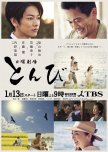
Viewers fresh from home or even on the cusp of building their own families may relate most to the tale dictated by Tonbi. The same might be said for those who, already having experienced much of life, are adjusting to empty nests. This drama builds an effectively nostalgic hometown backdrop, complete with unique landmarks and quirky, over-exaggerated denizens. With such a setting, themes and happenings are explored which remain universal despite whichever specific focus is placed on them. The result is a warm, emotional ride which is rather easy to connect with.
Several aspects struck me as slightly uneven nonetheless. The plot relies on various coincidences and, while I can allow for the fact that life sometimes hands out beautiful symmetry, there are too many to shrug. Many point out that Japan stumbles often with romantic love. As expected, few romantic relationships in Tonbi (including one which later becomes a major plot point) felt honestly loving. Because the true focus centers on bonds between parent and child, this is relatively forgivable. Lastly, much of the story is told by son Akira, either through flashbacks or as stories told to others. For the most part this works just fine, but these sequences frequently show characters from their own perspective. While it would be nice to have that level of insight in real life, this staggers somewhat strange. Even for a community of people as open as these, we rarely know everything others experience alone (especially our parents).
Near the start of Tonbi, I spent a reasonable amount of time deciding whether Uchino Masaaki was performing well. His Yasuo is larger than life, initially more like a dumb but lovable hound unable to control itself when excited than an actual person. Yet when all parts of his portrayal are placed together, brilliance flows forth. My favorite bits were his emotional revelations, becoming acquainted with the vulnerability and loneliness of the character. Sato Takeru improves every time I encounter him. His scenes often feel quite natural lately. While his Akira does not induce the same level of interest as Yasuo, the chemistry with Uchino-san makes this drama. A true degree of familial love seems to pass between them, whether they are sharing warm moments or standing in conflict.
Instrumental pieces in Tonbi are light and subtle. There are various gentle themes which play at pivotal moments, particularly those when a character is reminiscing or about to experience change. Overall suitable, the tender and unobtrusive way they are presented is simply wonderful. Fukuyama Masaharu provides the gorgeous theme ("Tanjobi ni wa Mashiro na Yuri wo"), with a voice that croons nostalgia with every syllable. Whenever it played during the final moments of an episode, my heart swelled.
Considerați utilă această recenzie?

